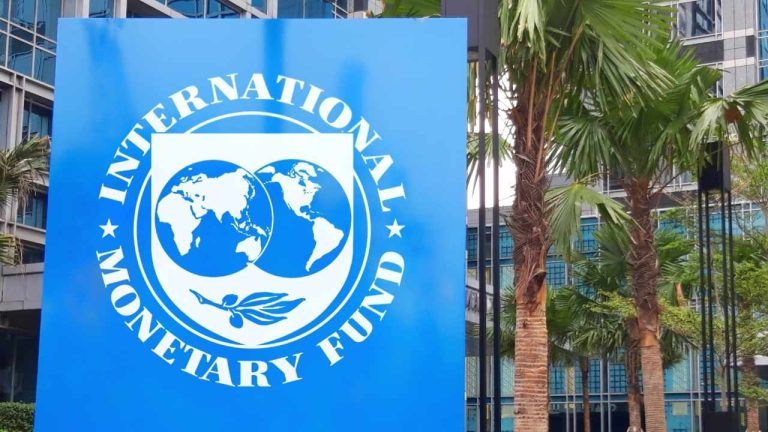
The plan would create markets for DAI-replacement USDS on Aave.
Decentralized finance (DeFi) protocols Aave and Sky (previously Maker) are exploring a partnership designed to “close the gap between DeFi and TradFi,” according to a Sept. 2 announcement.
The proposed partnership, referred to as the Sky Aave Force, follows a Sept. 2 governance proposal by Phoenix Labs, a DeFi research and development organization. The proposal suggests issuing SPK tokens—native to Sky’s subDAO, Spark—to help establish a market for USDS, a stablecoin launched after Maker’s August rebranding to Sky.
“Sky Aave Force has an ambitious goal: to drive mass adoption and close the gap between DeFi and TradFi. Now is the time to work together,” said Aave Labs, the developer behind the Aave DeFi lending platform.
 The governor of India’s central bank, the Reserve Bank of India (RBI), Shaktikanta Das, has highlighted the challenges of implementing cross-border digital currency interoperability and the necessity for robust governance. He emphasized the importance of gradual central bank digital currency (CBDC) rollout and data-driven insights from pilot programs. RBI Governor Warns of Challenges in Digital […]
The governor of India’s central bank, the Reserve Bank of India (RBI), Shaktikanta Das, has highlighted the challenges of implementing cross-border digital currency interoperability and the necessity for robust governance. He emphasized the importance of gradual central bank digital currency (CBDC) rollout and data-driven insights from pilot programs. RBI Governor Warns of Challenges in Digital […] A London high court has announced a global asset freeze targeting Onecoin’s co-founder Ruja Ignatova and associates. Over 400 investors sought this legal action after losing millions in the Onecoin cryptocurrency scam. The asset freeze prevents further movement of Ignatova’s wealth, possibly aiding victims’ compensation. Onecoin’s Ruja Ignatova Faces Global Asset Freeze Amid Investor Lawsuit […]
A London high court has announced a global asset freeze targeting Onecoin’s co-founder Ruja Ignatova and associates. Over 400 investors sought this legal action after losing millions in the Onecoin cryptocurrency scam. The asset freeze prevents further movement of Ignatova’s wealth, possibly aiding victims’ compensation. Onecoin’s Ruja Ignatova Faces Global Asset Freeze Amid Investor Lawsuit […] The International Monetary Fund (IMF) has reported progress in negotiations with El Salvador on policies to strengthen public finances, boost bank reserves, improve governance, and address bitcoin risks. Although many BTC risks haven’t materialized for El Salvador, the IMF stated that both parties agree on the need for enhanced transparency and measures to ensure fiscal […]
The International Monetary Fund (IMF) has reported progress in negotiations with El Salvador on policies to strengthen public finances, boost bank reserves, improve governance, and address bitcoin risks. Although many BTC risks haven’t materialized for El Salvador, the IMF stated that both parties agree on the need for enhanced transparency and measures to ensure fiscal […] Zksync, an Ethereum layer two (L2) network developed by Matter Labs, has launched a new community-driven governance system named ZK Nation. The system aims to enhance the governance, security, and scalability of the Zksync protocol through active community participation. ZK Nation: New Governance Framework Introduced by ZKsync According to the announcement, the ZK Nation governance […]
Zksync, an Ethereum layer two (L2) network developed by Matter Labs, has launched a new community-driven governance system named ZK Nation. The system aims to enhance the governance, security, and scalability of the Zksync protocol through active community participation. ZK Nation: New Governance Framework Introduced by ZKsync According to the announcement, the ZK Nation governance […]
Decentralized crypto exchange Uniswap (UNI) is skyrocketing after an upgrade was proposed to reward its token holders. In a new announcement, The Uniswap Foundation says the protocol’s governance lead has put forth a proposal that would reward traders who have staked and delegated UNI. According to the team, the proposal is of utmost importance to […]
The post Uniswap Soars Over 50% in 24 Hours After Protocol Upgrade Proposal To Reward Token Holders Put Forward appeared first on The Daily Hodl.

The system uses “time-lock puzzles” to encrypt the contents of votes, making them unreadable until balloting has finished.
Venture capital fund Andreessen Horowitz, also known as A16z, has released a Solidity library that can be used for anonymous voting on Ethereum. Called “Cicada,” the library prevents an individual voter’s choice from being known before polling ends. When combined with zero-knowledge group membership systems like Semaphore, it can also make the identity of the voter permanently unknowable, according to a May 24 blog post from A16z engineer Michael Zhu.
Excited to announce Cicada: a new building block for private on-chain voting. https://t.co/hxE4KL4Se6
— moodle zoup (@moodlezoup) May 24, 2023
Cicada relies on time-lock puzzles, a type of cryptography that allows users to encrypt secret values that can only be decrypted after a specific period of time has passed, Zhu stated.
These puzzles have been around since 1996. But before 2019, they would have required users to reveal their secret values once the time period had passed. In voting systems, this could have caused problems with users submitting votes and then going offline, preventing all the votes from being countable.
In 2019, the concept of “homomorphic” time-lock puzzles was proposed by cryptographers Giulio Malavolta and Aravind Thyagarajan. This allowed the puzzles to be added together to produce a final puzzle that was much easier to solve than the sum of the individual puzzles. The solution to the final puzzle reveals only the sum of the individual values without revealing the individual values making up this sum.
According to the A16z post, Cicada uses these homomorphic puzzles, allowing votes to be counted even if users go offline.
When attempting to transfer Malavolta and Thyagarajan’s system to the blockchain, A16z researchers ran into an obstacle to creating a fair voting system: Each choice needed to be encoded as a boolean value of “1” or “0.” This meant that attackers could try to increase their voting power by incorrectly encoding the vote — by encoding “100” as their value, for example.
To solve this problem, Cicada requires voters to submit a zero-knowledge proof of ballot validity along with each ballot, the post said. The proof shows that the vote was encoded correctly, but without revealing the contents of the vote.
Related: Anchorage Digital opens up DeFi voting for custody clients
Cicada only prevents votes from being known while the poll is being conducted. Once the “poll has closed” or the time-lock period has passed, any person can determine the contents of a vote by brute-forcing the solution to the puzzle. However, A16z suggested that this problem can be solved by combining Cicada with zero-knowledge group membership systems like Semaphore, Semacaulk or zero-knowledge state proofs. In this case, brute forcing the puzzle will only reveal that the vote was cast by an eligible voter but will not reveal the credentials used to prove the voter’s eligibility.
As an example, Zhu provided a link to a sample contract produced using Cicada that also relies on Semaphore to prove voter eligibility.
Voting systems have long been a component of decentralized autonomous organizations (DAOs), the governing bodies that often manage blockchain apps. But in most cases, DAOs use tokens to represent votes, which means that individual users can have an outsized influence if they hold a large number of tokens. For example, on May 22, an attacker took control of Tornado Cash by casting extra votes on a malicious proposal, using it to drain all of the governance contract’s funds. The attacker later offered to give back control to users.
Waves founder Sasha Ivanov has argued that DAOs must move to a more democratic voting system if governance attacks like these are to be avoided.
 FTX debtors revealed during a hearing on April 12th that the restructuring team has collected $7.3 billion in liquid assets. The exchange is currently considering a relaunch, according to a lawyer representing the defunct cryptocurrency exchange. Following the announcement, the exchange’s token, FTT, increased by over 70%, rising from $1.30 to $2.35 per unit. Lawyers […]
FTX debtors revealed during a hearing on April 12th that the restructuring team has collected $7.3 billion in liquid assets. The exchange is currently considering a relaunch, according to a lawyer representing the defunct cryptocurrency exchange. Following the announcement, the exchange’s token, FTT, increased by over 70%, rising from $1.30 to $2.35 per unit. Lawyers […]
The Arbitrum Foundation has made a couple of new governance proposals following the fracas that occurred over its first attempt.
The Arbitrum Foundation has released a raft of new improvement proposals following the fracas that ensued after its first failed attempt at governance.
On April 5, Ethereum layer-2 solutions provider Arbitrum posted new Arbitrum Improvement Proposals (AIPs) for the governance of the network.
The new proposals include AIP-1.1, which covers a smart contract lockup schedule, spending, budget and transparency. The other, AIP-1.2, tackles amendments to current founding documents and lowers the proposal threshold from 5 million Arbitrum (ARB) tokens to 1 million ARB “to make governance more accessible.”
In an April 5 tweet, it confirmed the Arbitrum DAO came to a consensus against its first proposal, AIP-1.
1/10 With the ArbitrumDAO reaching consensus against AIP-1, it's now time to incorporate community feedback, and move forward with new AIPs and documentation that address key areas of concern.
— Arbitrum (,) (@arbitrum) April 5, 2023
Details below
On April 2, the Arbitrum Foundation stated AIP-1 “likely will not pass” due to community backlash. Tokenholders objected to the proposal, arguing that it encompassed too many topics, and decried granting around $1 billion worth of ARB tokens to the foundation.
The foundation then backtracked, stating in an April 5 tweet that it would not take control of the tokens:
“The Foundation will not move any of the remaining 700M tokens in the Administrative Budget Wallet until an acceptable budget and smart contract lockup schedule have been approved by the DAO.”
The foundation also issued a transparency report that “describes actions taken to get the DAO up and running.”
“We have heard the feedback,” it stated, before adding that it has “worked diligently to address it and make sure the Foundation can represent, and serve the DAO’s best interests with their support.”
The two new AIPs were posted on the Arbitrum community forum and will be available for feedback for at least 72 hours before a planned week-long snapshot vote.
Related: Arbitrum to break up governance votes after community backlash
ARB prices have dropped 4% over the past 24 hours, falling to $1.22. The layer-2 token was dumped heavily following its airdrop on March 23 and is down 86% from its peak price of over $8.50 on that day.
Magazine: Unstablecoins: Depegging, bank runs and other risks loom

The Arbitrum Foundation has backtracked on a controversial proposal and ratification vote that gave it control of a huge chunk of tokens.
Ethereum layer 2 solutions provider Arbitrum has backtracked on its governance voting system following community backlash from token holders.
On April 2, the Arbitrum Foundation tweeted that its first governance proposal, AIP-1, “likely will not pass” and added its “committed to addressing the feedback received from the community.”
The move will break up the debatable governance package into smaller segments. The team noted:
“AIP-1 is too large and covers too many topics. We will follow the DAO’s advice and split the AIP into parts. This will allow the community to discuss and vote on the different subsections.”
The U-turn follows a weekend of community backlash over the foundation’s “ratification” vote for decisions it had already undertaken. The proposal would have given the foundation, a centralized company, control over 750 million Arbitrum (ARB) tokens worth around $1 billion.
Critics, such as decentralized finance and decentralization advocate Chris Blec, argued the proposal was “decentralization theatre.”
I just want to clarify:
— Chris Blec (@ChrisBlec) April 2, 2023
There is NOTHING decentralized about Arbitrum or Optimism.
Just because you can use a network without permission doesn’t mean it’s decentralized.
Both can halt the chain, modify any code, censor any transaction, freeze any wallet, or steal from the DAO.
The foundation stated that the 750 million tokens received would be voted on in its own AIP. “We’re working on options to add more accountability,” it stated, adding, “for example, a vesting period of 4 years. Furthermore, tokens held by the Foundation cannot be used to vote.”
There will also be a budgeting proposal, in which the foundation will propose transparency reports “to make the community aware of how the funds are spent over time.”
The Special Grants program is vague and lacks DAO involvement, the foundation stated. It will be renamed “Ecosystem Development Fund” with context provided on how the funds will be used to benefit the Arbitrum cosystem.
Related: Arbitrum’s first governance proposal sparks controversy with $1B at stake
The new Arbitrum Improvement Proposals will be issued “early this week,” the foundation concluded.
ARB token prices took a massive hit over the weekend, slumping 18% from an April 1 high of $1.40 to a low of $1.15 in the April 3 morning Asian trading session, according to CoinGecko.
ARB has seen an 86% price decline since its airdrop on March 23.
Hodler’s Digest: FTX EU opens withdrawal, Elon Musk calls for AI halt, and Binance news